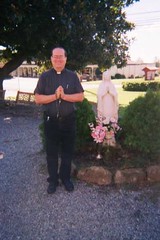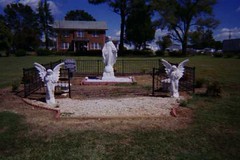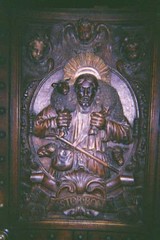Recommended Booklet:
A SCRIPTURAL CATECHISM by Fr. Herbert Burke
www.queenship.orgAlmost a decade ago, I bought several hundred copies of Fr. Burke's catechism, used it for religious instruction and sold a number in the Parish Gift Shop.
A week ago I order 50 copies and intend to use them in the religious formation efforts here at Holy Spirit Church. Much expanded from the original edition, it covers (in outline form) Church teaching, prayer, and our history. While there are some typos in the work, I highly recommend the book. The use of Scripture citations in regard to Catholic doctrine will be useful in Bible Study and to defend and explain the faith to others.
A FEW REFLECTIONSWhat is the Purpose of Life?"Perfect happiness can only be found in perfect life, love, and truth, which is God" (p. 1)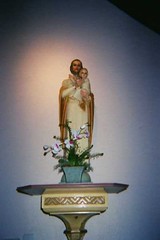
What Fr. Burke means is that lasting joy is only found with our insertion into the Trinitarian life. We are invited to participate in that divine Love between the Father and the Son which we call the Holy Spirit. Salvation becomes literally incorporation and divinization. God is the source and the preeminent degree of all perfections. As finite creatures, our entrance into the inner life of God will never exhaust that eternal life which is properly his. God is the Creator and Father of everything that exists. However, he has made men and women to know, love and serve him in this world and forever in the next. We are reminded that God the Son is the living Word, the one IDEA of God that emcompasses everything and is the plan for all creation. Divine providence is working toward the consummation and restoration of all things in Christ. Our Lord sent the Holy Spirit upon the infant Church and God has empowered the sacraments and protected the truth in every age. We are made temples of the Holy Spirit; personified and divine Love bonds us to one another and to God.
"Happiness does not exist in temporary and imperfect, material possessions (Lk 12:15), sensual pleasures (Ec 1:8), and human friendship, but only in perfect and eternal friendship with God" (p. 1).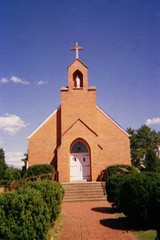
What is meant here is TRUE or REAL or LASTING happiness. We were made for God. Separation from God frustrates the end for which we were made. Obviously, the list of preoccupations here bring some happiness and pleasure. However, earthly joy is fleeting and elusive. Many of us are collectors and it is joked that the reason why houses are so large these days is because we need more space for our many things. Material possessions can bring a degree of contentment and give us a sense of accomplishment; however, we are mindful of the proverb, what good would it be to gain the whole world and forfeit our immortal souls? A major storm or fire can make short work of our material belongings. We are told to yearn for imperishable treasure, which neither time nor the evil of men can strip away from us. Sensual pleasure as in sex, drugs, alcohol, or food, lasts but a short time and then we must deal with their consequences. Even human friendships should not compete with our relationship with the Lord. This is not a case of "either/or" because union with God makes possible a deeper intimacy with one another and with the communion of the saints. Heaven represents a joy that never ends-- that has no ill consequences-- that never becomes routine or boring. All earthly goods with the happiness they bring are but a foretaste of what awaits us. It is not that the sources of earthly happiness are evil, because God is their source and all that he creates is good. Rather, they are not to be pursued for themselves but rather for that to which they point-- the banquet that never ends and where every course is better than the last-- the heavenly marriage banquet of the Lamb of God.
How Can We Experience God?"By opening our hearts in prayer and asking for His Holy Spirit to come into our heart and life, and by turning our backs on sin (Lk 11:13)" (p. 2)The question here is "How Can We Experience God?" The citation to Luke
reminds us that we are sinners and that all have fallen short of the glory of God: "If you then, who are wicked, know how to give good gifts to your children, how much more will the Father in heaven give the holy Spirit to those who ask him?" Obviously, being a Christian disciple implies repentance and faith in Jesus Christ. It is the Holy Spirit that makes possible our initial faith and that maintains it throughout our life. No one can say Jesus is Lord unless it is given him by God to know him. Christian prayer has as its goal, a deeper relationship with the Lord. Christ gave us the gift of the Holy Spirit on Pentecost and in our prayer and obedience we are to live in the Spirit of God. This Spirit is transformative, filling us with grace and forming us ever more and more into the likeness of Christ. While there is often an experiential satisfaction to prayer, it must be acknowledged that this relationship is not dependent upon emootinal highs or feelings. Faith would tell us that God is present even when we do not "feel" him near. As long as we avoid mortal sin, he lives in the human soul. Our minds can know him and his truths. Our hearts can love and yearn for him. Our bodies can serve him in a life of obedience and charity.
We experience God in many ways. We see something of his mark in nature, the things he created. We encounter the Lord in the Church, through the sacraments, the Word proclaimed and the sacred traditions passed down to us. We dialogue with him in prayer, placing our lives into his hands and trusting his will for us. We can also see something of the holiness of God in the innocence of a baby and an element of his courageous Cross in the sacrifices that people make out of selfless love for others.
Divine Revelation"Divine Revelation is the Word of God. It is the truth God reveals to us about Himself and what we need to know to enter heaven" (p. 4).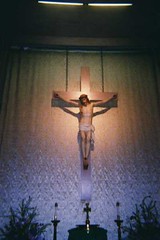
Christ is the revelation of the Father. Fr. Burke is quite right that the Word of God is both the Bible and sacred Tradition-- it is the kerygma of salvation! None are ultimately saved apart from Christ. Even the Holy Father's statements about the Jews, Moslems, and others from non-Christian religions must be understood in this light. The old dispensation with the Jews still has efficacy in that God made an everlasting covenant with them and God keeps his promises. The situation is more problematical with other religions, but not hopeless. Notice that we pray for them and even for those who claim to believe in nothing in the supplications from the Good Friday liturgy. The Church would not do this unless we had confidence that God would hear our prayer. We leave to God alone the right to judge souls. However, what we must insist upon is the importance of the Church's missionary mandate to go out and to make disciples of all nations and to baptize in the name of the Father and of the Son and of the Holy Spirit. It is Jesus who opens the gates of heaven. It is Jesus who is the living PONTIFEX or BRIDGE into the kingdom. There is no other saving name and no other way to the Father. Jesus is the Way and the Truth and the Life. Not all religions are the same, and while agreeing upon some truths, many are riddled with serious errors. We should not become complacent in spreading the Gospel. While ignorance of the truth will be taken into consideration by God in the disposition of certain souls, we will be held accountable for our efforts to dispel ignorance in order to bring the light of true faith. The more one is given, the more for which we are responsible. It is in this sense that no Christian can utterly privatize his faith or as the Scriptures remind us, wrongly hide it under a bushel basket.
Sacred Tradition"Tradition is the spoken Word of God passed on from Christ to the Apostles and from the Apostles to the Church (2 Thess 2:15; 1 Cor 11:2; Mt 28:19)" (p. 4).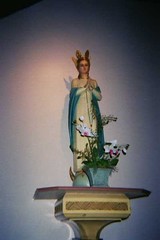
What Fr. Burke is referencing here is the oral tradition of the Church. Even the Gospels were formed from the oral tradition, wherein the teaching Church proclaimed the Good News for several centuries before their was an official canon of Old and New Testament books. Much of the oral tradition would be written down, however, some of these works would be discerned as inspired by God and would be collected by the Church for inclusion in her Bible. Sacred tradition today is both written and oral, and efficacious of faith. While salvation truth is found in the Scriptures, the sacred tradition is the second tier of Divine Revelation. Clement I (an early successor to St. Peter) wrote an Epistle to the Corinthians that asserted his universal jurisdiction and urged them to behave as good Christians should. Some thought that this letter, one of many early documents, would be in the Bible. Indeed, the letter from about 93 AD is probably older than the Gospel of John and the Book of Revelation! It represents an element of tradition, albeit written, from the apostolic and early Church. There were many such documents. Tradition included oral sayings, letters, and other written documents of faith. It centered, not only upon teachings of faith, but from the experience of the disciples who spent time with our Lord and saw his works. Their behavior and actions becomes a part of this tradition passed down to us. Some traditions go back to Christ himself and the apostles. These are the most important. While revelation as such dies with the death of the last apostle John, the Church contends that there is a dynamic element to Church doctrine from Scripture and Tradition that allows it to develop with the reflection of the Church throughout the ages.
Science and Religion"Science cannot tell us what is right or wrong, or what we should live for, only Divine Revelation can" (pp. 5-6).It is argued that right reason can prove the existence of God; however, it is only revelation and faith that can tell us that this God actually cares about us and that he wants a relationship of prayer and obedience with us. Scientists study creation and certainly a number of them contend that the laws of nature point to a lawgiver. However, while Divine Revelation gives us God's name (YAHWEH and JESUS CHRIST) and address (heaven) and phone number (prayer), science stops far short of such assertions. Science and faith are not in conflict because all truth is complementary. But they ask different questions.
Fr. Burke is asserting that the commandments, the beatitudes, and other Scriptural mandates give us guidance to live our lives that science could never muster on its own. However, this is not to say that real science has nothing to say with how we live our lives and the distinction of right from wrong. Natural law itself, while often relegated to philosophy, hinges upon a scientific understanding of the natural order. Thus science makes a contribution in our understanding of nature and how our actions should not conflict with the patterns and order established. For instance, science would tell us that cigarettes cause cancer and that it would be wise to avoid them. Science and technology reveals the humanity of the unborn child in the womb and might hinder the deceptions around abortion. Science tells us that there are patterns of fertility that can be followed in natural family planning. The fact that science can be abused and misused is evidence that the voice of science alone is insufficient to guide us regarding right and wrong decisions.
Matter and Form of the Sacraments"Form constitutes the words used in the administration of the sacrament; matter involves the the pouring of water for baptism, bread and wine for mass, anointing with oil for confirmation and the anointing of the sick, contrition for confession, laying on of hands for ordination, and mutual consent for a couple choosing marriage" (p. 23). Some clarification might be in order here regarding these scholastic categories. What Fr. Burke says here is quite correct although there is some debate among authorities as to what the matter and form for certain sacraments might be. Also, the form of a sacrament can be both words and sacred signs (actions, gestures, or rituals). However, confusing the issue, sometimes the gesture itself is seen as the material sign. The form of Baptism are the words which invoke the Trinity; the matter is water. The form for the Eucharist are the words of consecration; the matter is bread and wine. The form in Penance are the words of absolution; the matter is contrition. (Spelling it out, the matter is reckoned as the acts of the penitent: contrition, confession, firm purpose of amendment and satisfaction). When it comes to Confirmation, the words used while anointing certainly belong to the form, but some locate the laying on of hands here while most others associate it with the matter of chrism oil and the making of the sign of the cross. The form for the Anointing of the Sick would be the words while the olive oil would be the matter. The form for Holy Orders are the designated words which express the intention of the bishop and the matter is reckoned as the laying on of hands. However, some authorities also contend that the matter includes the handing over of the sacred vessels. Given recent debates, one could also argue that proper matter also includes a male human being disposed to ordination. Fr. Burke states here that the matter of marriage is the mutual consent. However, many authorities would argue that the exchange of vows, as words, are really an element of the form of the sacrament. If one argues that the matter of marriage are the vows and mutual consent, then the form would be reduced to the presence of a priest. However, canonical form (a priest and two witnesses) may be distinct from the sacramental. A couple who are castaways on a deserted island would not need a priest for a real marriage, because the law of the Church does not bind when impossible. Speaking for myself, I would consider the exchange of vows to be the form and the matter would be the bodies of the couple. The marriage becomes indissolable with the subsequent consummation (non-contraceptive marital act). This is where the mutual consent is fully realized. [This sidesteps the debate as to whether a marriage is fully sacramental or indissoluble prior to the marital act.]
QUICK CLARIFICATIONSAngels: Messengers of God - Despite the way in which they may appear, angels have no material bodies and are pure spirits with angelic powers. (p. 10)
Serious Matter of Mortal Sin - The matter of fault must truly be wrong. When Fr. Burke says that it "must be seriously wrong or believed to be" he means according to the determination of the Church and in respect to God's revealed law. If something is not objectively a grave matter, then the sin would be venial, not mortal. (p. 12)
Purgatory - This place of transition is indeed an opportunity to make up for penance not completed on earth. Further, there is a real purgation or cleansing by the fire of God's merciful love. Souls in purgatory suffer a weaning from those last attachments to a propensity to sin and the stain of venial sin. Temporal punishment must be satisfied. However, they are still technically saints because their place in heaven is assured. (p. 21)
You Shall Not Steal - Fr. Burke makes this qualification, "one can take food to survive when in danger of starvation" (p. 32). This is a thorny subject. What if the destitute make use of another's land or property to survive? Is it wrong to take without payment medicine necessary for your spouse to live? Can poor people without insurance insist upon being treated for serious ailments at hospital emergency rooms? The Church would insist that the value of life takes precedence, but that does not calm the anger of those taking a loss.
Four Main Purposes of Prayer - Fr. Burke lists
Adoration, Thanksgiving, Reparation and Petition. I recall that Msgr. William Awalt used a mnemonic: ACTS -
Adoration,
Contrition,
Thanksgiving and
Supplication. It is understood here as basically the same thing although some authorities make distinctions between
Reparation or
Satisfaction (accomplished by Christ but with our participation) and the word
Contrition (sorrow for sin). Further, the word
Praise (honor given the Creator for his creation) might be used interchangeably with
Adoration (honoring God for his
glory apart from his gifts) although it might be closer to
Thanksgiving (appreciation shown for God's blessings to us). (p. 40)
Right Priority at Prayer - "There are three answers to prayer--yes, no, and please wait" (p. 41). I would only like to add that sometimes God answers our prayers with a twist, in a way we did not expect.
The Appendix (pp. 55-83) is from approved sources but is not under the 1995 Imprimatur.
